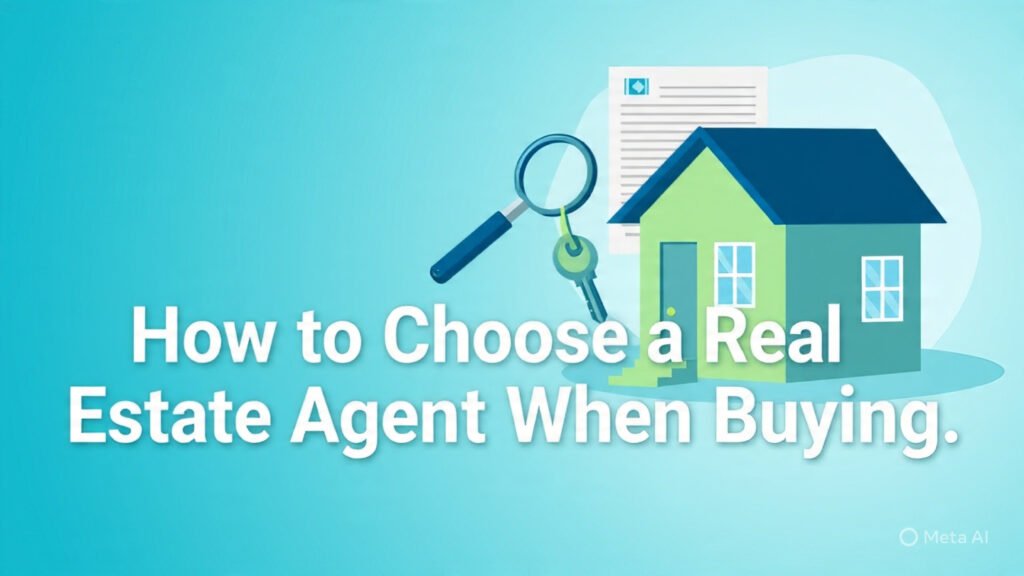Introduction
Buying a home is one of the most important financial and personal decisions you’ll ever make. For first-time buyers or even experienced homeowners, choosing the right real estate agent can make the process smoother, less stressful, and more successful. A good agent guides you through property searches, negotiations, paperwork, and closing. But with so many agents to choose from, how do you pick the right one? This guide explains what to look for when hiring a real estate agent to buy your home.

Understand the Role of a Buyer’s Agent
A buyer’s agent represents your interests in the home-buying process. Unlike listing agents who work for sellers, buyer’s agents focus on helping you find the right home at the best price. They:
- Provide market insights and neighborhood comparisons
- Arrange property viewings and open houses
- Help negotiate offers and counteroffers
- Guide you through contracts, disclosures, and closing steps
Understanding this role is the first step toward choosing the right professional to support your purchase.
Look for Experience and Local Knowledge
Experience matters in real estate. An agent with years of practice and deep knowledge of the local housing market can:
- Spot undervalued properties
- Warn you about potential issues in neighborhoods
- Explain price trends and inventory levels
- Recommend trusted mortgage lenders, inspectors, and attorneys
Always ask how long the agent has worked in your target market and how many buyers they have successfully represented.
Check Credentials and Licensing
Real estate agents must be licensed by the state in which they work. Additionally, some professionals carry extra designations that reflect advanced training, such as:
- ABR (Accredited Buyer’s Representative) – specialized in representing buyers
- CRS (Certified Residential Specialist) – expertise in residential transactions
- SRES (Senior Real Estate Specialist) – helping older clients downsize or transition
Checking credentials ensures your agent meets professional and legal standards.
Interview Multiple Agents
Don’t settle on the first person you meet. Interview at least two to three agents and ask questions like:
- How long have you been working in real estate?
- How many buyers do you typically represent per year?
- Can you provide references from past clients?
- What’s your availability for showings and communication?
This process allows you to compare personalities, experience, and communication styles.
Assess Communication and Compatibility
Buying a house involves constant updates and decisions. If your agent is hard to reach or unclear in their responses, it could lead to frustration. Look for someone who:
- Responds quickly to calls, texts, or emails
- Explains complex terms in simple language
- Listens to your priorities (budget, location, style)
- Makes you feel comfortable and respected
Compatibility ensures that the process is less stressful and more collaborative.
Understand Their Commission Structure
Real estate agents typically earn a commission (a percentage of the home’s sale price), which is usually paid by the seller. However, in some cases, buyer’s agents may have agreements for shared fees or additional costs. Always clarify:
- How the agent gets paid
- Whether you’ll owe anything out-of-pocket
- If they’re open to negotiation
Transparency about fees protects you from surprises later.
Red Flags to Avoid
While many agents are professional and trustworthy, watch out for warning signs like:
- Pressuring you to buy quickly
- Pushing homes outside your budget
- Avoiding direct answers to your questions
- Lack of references or poor reviews
- Limited knowledge of your target area
If you feel uncomfortable or pressured, it’s okay to walk away and find someone else.
FAQs on Choosing a Real Estate Agent
1. Do I really need a real estate agent to buy a house?
Yes, while you can purchase a home without an agent, having one can save time, reduce stress, and potentially save money during negotiations.
2. How do I know if an agent is trustworthy?
Look for verified licenses, positive reviews, client testimonials, and transparency in communication.
3. Should I sign an exclusive agreement with a buyer’s agent?
An exclusive agreement can benefit you by ensuring the agent is committed, but make sure you understand the terms before signing.
4. Can I change my agent if I’m not satisfied?
Yes, in most cases you can end the agreement, but review your contract to understand any restrictions or notice requirements.
5. Is it better to use a friend or family member as my agent?
While it may seem convenient, mixing personal relationships with financial decisions can be tricky. Choose based on experience and professionalism.
Conclusion
Choosing a real estate agent is a major decision that directly impacts your home-buying experience. Focus on finding someone experienced, communicative, and dedicated to your needs. By asking the right questions, checking credentials, and trusting your instincts, you’ll be better prepared to select an agent who will guide you through one of life’s biggest investments with confidence. Also, read about Down Payment Assistance Programs Explained – Complete Guide if you are interested.
⚠️ Disclaimer: This article provides general real estate information for educational purposes only. Always consult a licensed real estate advisor or attorney for guidance tailored to your specific situation.